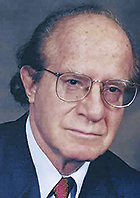Halpern to Be Honored Posthumously For Human Rights Efforts
Abstract
Through a 50-year career, Halpern was a dedicated human-rights activist who fought abuses no matter where on the globe they occurred. He will be honored at the APA annual meeting.

Abraham Halpern, M.D.
One of the country’s leading forensic psychiatrists, Abraham Halpern, M.D., died April 20 at age 88 of complications following a fall. To honor him, the American Association for Social Psychiatry will present him posthumously with its Annual Humanitarian Award, which it is renaming in his honor. It is also dedicating a forum at this month’s APA annual meeting to Halpern, who was scheduled to participate in the forum. It is titled “Humanitarian Challenges in Psychiatry: A Model of Forensics, Ethics, and Advocacy.”
Halpern was born in Poland and immigrated to Canada with his family in 1927. After serving in the Royal Canadian Navy, he attended medical school at the University of Toronto.
Halpern became a passionate human-rights advocate who marched with Dr. Martin Luther King Jr. in civil-rights protests, marshaled opposition to China’s abuse of Falun Gong adherents, and was a vociferous and tireless opponent of the death penalty and any participation by physicians in that process.
During a 50-year psychiatric career, he was a professor of psychiatry at New York Medical College, president of the American Academy of Psychiatry and the Law, and recipient of many honors and awards. In 2000, APA bestowed its Human Rights Award on Halpern, citing his extensive efforts to fight against capital punishment and for the release of political prisoners who were committed to Soviet psychiatric hospitals though they had no mental illness.
For many years Halpern served on APA’s Committee on International Abuse of Psychiatry and Psychiatrists. One of his colleagues on that committee, former APA President Lawrence Hartmann, M.D., hailed Halpern as “a tenacious good man, who over many decades was one of the reliable consciences of psychiatry.” ■



